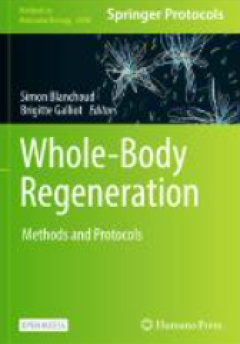Ditapis dengan
E-book Here for the Hearing : Analyzing the Music in Musical Theater
Twenty years ago, very few music scholars examined Broadway musicals. If musicologists were a bit slow to approach the musical theater reper-toire (and they were), theorists and analysts arrived—and are only now arriving—more than fashionably late to the party. We hope that this vol-ume loudly announces that we are here.Music theorists care about musical theater. We kn…
- Edisi
- -
- ISBN/ISSN
- 9780472903535
- Deskripsi Fisik
- 311 hlm
- Judul Seri
- -
- No. Panggil
- 781.63 BLU h

E-book Whole-Body Regeneration : Methods and Protocols
Over the last two decades, new cell and molecular biology toolshave become available, allowing the exploration of a broader rangeof metazoan regenerative mechanisms and prompting a (re)-expansion of the field of regenerative biology [3, 4]. A unifyingtheory of regeneration is nevertheless still lacking. Why do not allspecies regenerate? Does regeneration have a single or multiple(evolutionary) …
- Edisi
- -
- ISBN/ISSN
- 9781071621721
- Deskripsi Fisik
- 672 hlm
- Judul Seri
- -
- No. Panggil
- 571.6 BAL w
E-book Modern China, 1840–1972 : An Introduction to Sources and Aids
Graduate students have traditionally learned a good part ofwhat they know about sources and research aids on modern Chinathrough hearsay and serendipity, in unsystematic and unreliable bitsand pieces. The field has now developed to the point where thisneed not and ought not to be so. It is now possible for beginningresearcher…
- Edisi
- -
- ISBN/ISSN
- 9780472901869
- Deskripsi Fisik
- 111 hlm
- Judul Seri
- -
- No. Panggil
- 951 NAT m
E-Book Arts for Transformative Education: A Guide for Teachers from the UNESC…
The arts offer tremendous potential for enriching, enlivening and propelling learning that transforms individuals and communities. Arts learning fuels transformative education that helps increase students’ capacity and motivation to build a more peaceful and sustainable world. However, to fully realize that potential, teachers must mindfully structure and support educational experiences to op…
- Edisi
- -
- ISBN/ISSN
- 9789231006517
- Deskripsi Fisik
- 67 halaman
- Judul Seri
- -
- No. Panggil
- 707 UNE a
E-book Introduction to Philosophy
For most college students, an Introduction to Philosophy course is their first encounter with the study of philosophy. Unlike most of your other courses, philosophy is not something usually covered in high school. Yet you are probably familiar with the term philosophy and may have some preconceived notion about what philosophy is and what philosophers do. Perhaps you have stayed up late at nig…
- Edisi
- -
- ISBN/ISSN
- 9781951693596
- Deskripsi Fisik
- 419 hlm
- Judul Seri
- -
- No. Panggil
- 101 SMI i

The lonely crowd
- Edisi
- -
- ISBN/ISSN
- -
- Deskripsi Fisik
- xi; 315 hlm;;13 x 20 cm
- Judul Seri
- -
- No. Panggil
- 158 RIE t
- Edisi
- -
- ISBN/ISSN
- -
- Deskripsi Fisik
- xi; 315 hlm;;13 x 20 cm
- Judul Seri
- -
- No. Panggil
- 158 RIE t
 Karya Umum
Karya Umum  Filsafat
Filsafat  Agama
Agama  Ilmu-ilmu Sosial
Ilmu-ilmu Sosial  Bahasa
Bahasa  Ilmu-ilmu Murni
Ilmu-ilmu Murni  Ilmu-ilmu Terapan
Ilmu-ilmu Terapan  Kesenian, Hiburan, dan Olahraga
Kesenian, Hiburan, dan Olahraga  Kesusastraan
Kesusastraan  Geografi dan Sejarah
Geografi dan Sejarah